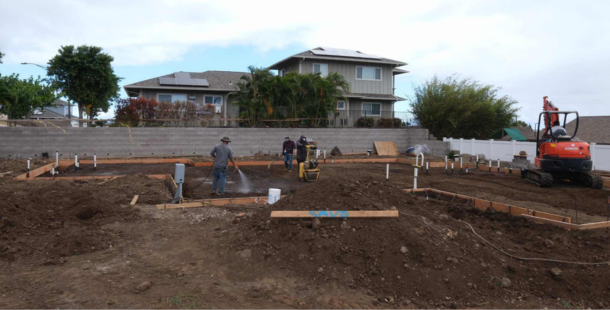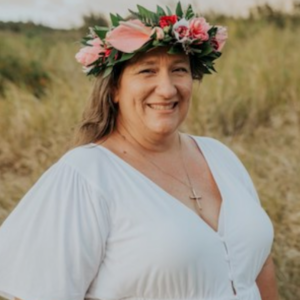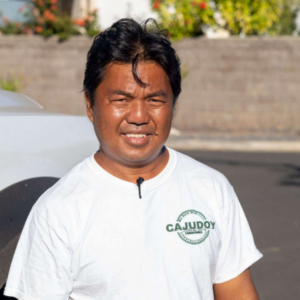Back

Blog
Rebuilding Dreams: Two Maui Entrepreneurs’ Inspiring Journey Through Natural Disaster and Recovery
By ICIC | April 17, 2024
Picture a life on a beautiful island, with a loving partner by your side, a thriving community, and a successful business. That’s the life that Brandy and Eric Cajudoy created for themselves. Their shared passion for family and community led to their union, but neither aspired to be a full-time entrepreneur. Brandy was a math teacher for 15 years, while Eric was a skilled baker in hotel kitchens. They owned short-term rental properties and occasionally dabbled in construction projects and to supplement their income. As their family grew, Eric’s demanding schedule in the hotel industry, which left him little time to spend at home, began to weigh on him. Both Brandy and Eric desired to be more present in the lives of their two children. Motivated to create lasting memories with their family, they left full-time employment. In 2017, they co-founded Cajudoy Construction, a woman-owned/led, family-operated general contractor based in central Maui.

The company specializes in residential builds and credits its steady growth to the close-knit community on the island. Brandy expressed, “Maui is big, but it’s so small. Everybody knows everybody. You either went to high school with somebody, or you’re actually related to somebody. So, we have no advertising whatsoever. From the beginning, it was all about word of mouth. I give all the credit to my community.” It was connections in the community that helped them expand their business portfolio from custom homes and remodeling to commercial projects. By 2023, they were ready to tackle a new challenge: government contracts. They knew they could fund the upfront cost of a government project with a substantial residential contract. Securing one of the highest-paying residential contracts the business ever had and its first government job, the Cajudoys felt ready for the future. Then came the fire.
Paradise Destroyed
In early August, Maui’s climate was primed for wildfires. Varying levels of drought conditions and strong winds, due to a high-pressure system north of Hawaii and an intensifying hurricane in the south, put the island on alert. But no one expected the level of destruction that took place on August 8, 2023. Several fires broke out and, driven by the wind, impacted multiple locations. The Maui fire was the fifth deadliest in recorded U.S. history. The greatest loss of life and the most significant property damage was experienced on the west side of the island in the historic town of Lahaina. According to the preliminary after-action report released by the Maui Police Department, the fires claimed 100 lives and burned a total of 6,693 acres. Upwards of 30% of the burned acreage was in Lahaina, where more than 3,000 dwellings and units were destroyed.
Video from Maui Now showing the destruction caused by the wildfires. VC: Maui Now and Fran Santos.
The ripples of the fire’s destruction were felt throughout the island. The Cajudoys final payment for the $1M+ residential contract, of which they had completed 95%, literally went up in flames. The project was consumed in the wildfire, indefinitely stalling the collection of the remaining balance. That income was desperately needed to help fund the initial costs of upcoming work, including the project with the state government. Without it, every future contract was in jeopardy. To make matters worse, visits to the island, a major source of income for the economy, dropped by more than 50% in the months following the fire. This resulted in a halt to the additional income that Brandy was earning from investment properties and exacerbated the challenge of keeping the business running.
“It was like COVID without any assistance. The entire area just stopped working, and no one knew what to do.”
Companies like Cajudoy Construction scrambled to salvage existing contracts while managing missed payments from clients, delays from insurance companies, and the endless stream of paperwork that needed to be completed to have any hope of receiving partial reimbursements. The direct impact of the wildfires was isolated to specific areas, but the indirect impact of the destruction was experienced across the small island community. Relief efforts that were effective during COVID, like mortgage deferment and low-interest small business loans, were not made available to residents outside of Lahaina who were affected differently by the disaster. “We didn’t lose a house. We didn’t lose clothes off our backs. We didn’t lose a car. But we were devastated,” recalled Brandy. “It was like COVID without any assistance. The entire area just stopped working, and no one knew what to do.”
Navigating the Road to Recovery
It’s been eight months since the fire, and Cajudoy Construction has not yet fully recovered from its traumatic and devastating effects. But Brandy and Eric haven’t given up on their business or their community. With grit and determination, Brandy, who manages the company’s books, opted out of advice to sue clients who could not pay their invoices due to losses from the fire. Instead, she found temporary financial support from family and local capital providers, enabling the business to push forward and complete its first state contract. With one state job under their belt, the company aimed to bid for another larger job that required a higher line of credit.
Brandy’s resilience again kicked in, along with some skills learned in ICIC’s Building for Growth (BFG) program. BFG is a national, online, tuition-free executive education program that helps primarily BIPOC-, woman-, and veteran-owned construction contractors build capacity and develop sustainable growth strategies. Having completed ICIC’s Inner City Capital Connections program in 2021, Brandy knew the value of dedicating time to working on her business. She participated in BFG’s Spring 2023 cohort, which ended shortly after the fire.
“BFG helped us put our pitch together. That pitch allowed us to sell ourselves to a bookkeeping company, which certified our financials. From there, we were able to get approved through our bank for the line of credit we needed to bid for larger state jobs.”
Ever committed to the Maui community, Brandy wanted to secure the new credit line from her bank of 30 years. However, the bank had denied previous applications for larger lines of credit from the business. She stated, “BFG helped us put our pitch together. That pitch allowed us to sell ourselves to a bookkeeping company, which certified our financials. From there, we were able to get approved through our bank for the line of credit we needed to bid for larger state jobs.”
Looking Ahead with Hope

While there is still much work to be done for the island of Maui and its residents to fully recover from the devastating effects of the fire, Brady has hope. “The Maui community is strong. Lahaina is strong. I’m telling you, they’re a different breed. We will recover.” To aid in the recovery, the Federal Emergency Management Agency’s (FEMA) relief efforts include creating a long-term recovery board comprised of local community leaders in key areas. Brandy has been selected to serve as the leader of the construction community on the board.

No entrepreneur expects to face a natural disaster, yet Brandy and Eric now join the thousands of business owners who have endured its unfathomable destruction. Brandy’s advice to those who may face this in the future is to be mentally strong. She credits her husband’s mental fortitude and support as the key element in their recovery. And for those who are facing the typical ups and downs of business ownership, she advises, “Don’t give up. Ask questions until you get the answers. There are so many programs that can help you start and grow your business–for free. I didn’t pay anything for the BFG or ICCC programs. The help is out there. You just have to look for it. Don’t be afraid to ask, and don’t be afraid to continue moving.”
About Building for Growth
ICIC provides tuition-free development programs that serve small businesses throughout their lifecycle—from startup to succession. Building for Growth (BFG), one of ICIC’s newest educational offerings, is a national, online, executive education program that helps primarily BIPOC-, woman-, and veteran-owned construction contractors build capacity and develop sustainable growth strategies that position their businesses to increase profits. BFG combines 18 online weekly classes, dedicated technical assistance, and long-term mentorship to successfully scale construction businesses. The program was launched in 2022 and has helped more than 160 companies across 29 states, of which 85% were BIPOC-owned, 62% were woman-owned, and 11% were veteran-owned.
Learn more about BFG and apply for upcoming cohorts at icic.org/bfg.
